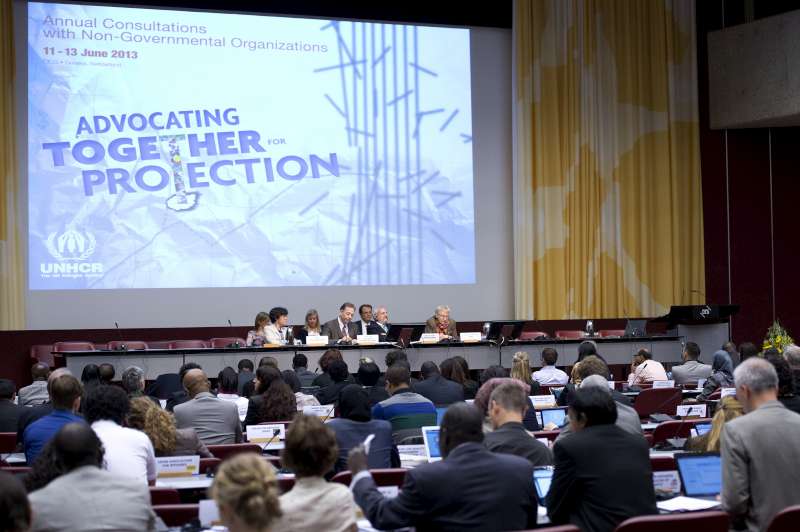UNHCR's annual consultations with NGOs open in Geneva
Deputy High Commissioner for Refugees T. Alexander Aleinikoff opens the gathering by stressing the importance of advocating together for protection.

The opening of this year's annual consultations with non-governmental organizations in Geneva. © UNHCR/J-M Ferré
GENEVA, June 11 (UNHCR) - UN Deputy High Commissioner for Refugees T. Alexander Aleinikoff on Tuesday opened annual consultations with NGO partners in Geneva by stressing the importance of advocating together for protection for displaced people at a time of multiple crises.
"To use a British expression, you work with us cheek by jowl, and we advocate shoulder-to-shoulder for the protection of the forcibly displaced," Aleiníkoff told more than 400 delegates at this year's three-day gathering with non-governmental organizations from around the world. "We couldn't do our work without you," he stressed.
Addressing this year's theme of joint advocacy for protection, Aleinikoff said that - especially in light of the many displacement emergencies in recent years - UNHCR's activities can appear to be focused on delivering life-saving services and supplies.
But he added that it was essential to remember that UNHCR is also charged with "providing protection and seeking solutions" - such as helping register refugees so they can enjoy legal rights or helping build schools, train hundreds of teachers and make education accessible to more than 340,000 children in the past two years alone, and help prepare them to earn a living and to live independently.
"Emergencies have dominated our work together for these past few years, but as you well know a significant majority of refugees live in protracted situations … and this is a failure of the international refugee regime that refugees live for years, for decades, as refugees," the Deputy High Commissioner said. "Now here the advocacy is of a different nature, because what's required to solve these situations is the political will of the international community."
Taking into account the crises competing for attention and the scarcity of resources to address them, effective advocacy can only come through even closer cooperation between UNHCR and its NGO partners.
And Aleinikoff said he welcomed that collaboration, whether it involves UNHCR working within the system and an NGO taking a more robust approach outside the established humanitarian framework. "That's fine," he said, "both of these approaches serve their goals, so long as we remain committed to the goals at the end of providing protection and seeking solutions."
Nan Buzard, executive director of the International Council of Voluntary Agencies (ICVA), agreed there were serious challenges for UNHCR, NGOs and the entire humanitarian community, including a growing number of issues to deal with and a growing number of actors. She said this was reflected in the growing importance of the annual UNHCR-NGO consultations, which this year have attracted delegates from 225 organizations from 76 countries.
"Our agenda is bursting at the seams," she said, adding that the challenge of advocating for protection and other durable solutions was daunting. "I hope in these consultations we will think about more conversations, more planning to include development actors early on in negotiations with host states - to create and explore new and different incentives and leverages in the context and needs of these host countries."
Topics to be covered during the three-day consultations include the Syria crisis; solutions for internally displaced people; sexual and gender-based violence; protection of people with special needs, including those persecuted for their sexual orientation; unaccompanied children; indigenous people; people of African descent in the Americas; statelessness; and strengthening partnership agreements.
For more than two decades, the consultations in Geneva have brought together NGOs and UNHCR managers to examine all aspects of their partnership on behalf of the world's uprooted people. NGOs are vital partners for UNHCR, implementing programmes for refugees and internally displaced people in some of the world's most remote and difficult places.
By Daniel MacIsaac in Geneva
